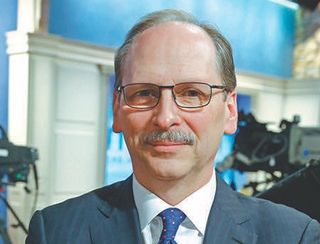The Five Spot: Edward Swindler

In August 2013, Edward Swindler was named president of NBCUniversal Domestic Television Distribution, overseeing all of NBC’s first-run and off-netnetwork syndication efforts. He was also named president of NBC Broadcast Operations. It was a big change for Swindler, who has worked mostly in financial, sales and operational roles since joining NBC in 1984. From 2006-12, he was executive VP and COO of ad sales for NBCU’s 20 broadcast and cable nets and more than 40 websites.
Swindler seems to have adapted swiftly to his new position. He makes a point of regularly watching all of the division’s first-run programs, including Access Hollywood, Steve Harvey, Maury and Jerry Springer. He has also gotten deeply involved with the company’s launch this fall of the daytime entertainment strip Harry, starring Harry Connick Jr. An edited transcript of Swindler’s conversation with B&C contributing editor Paige Albiniak follows.
How will NBCUDTD’s first-run shows be involved in and take advantage of the Olympics?
Like we did with Steve Harvey in the 2012 London Olympics, we’re going to use the Rio Olympics to help promote Harry leading up to the launch. It’s probably going to be one of the higher-rated Olympics ever because of the time period (just one hour ahead of the East Coast). Because the Olympics reach virtually all American viewers, it’s a very effective way to reach viewers. Access Hollywood is heading into its 21st season—the [AH] content we had coming out of [the ’14 Winter Games in] Sochi was some of the most fun coming out of any of our productions.
What is the story behind Billy Bush going to Today and Natalie Morales coming to Access Hollywood and Access Hollywood Live?
Today was looking to evolve the 9 a.m. hour. When it was clear that Natalie wanted to come to the West Coast, she asked us if there would be any interest in her joining Access Hollywood Live. We thought that was a huge opportunity. It seemed like perfect synergy, especially when she’s going to be West Coast host of Today.
What are your expectations for Harry?
Broadcasting & Cable Newsletter
The smarter way to stay on top of broadcasting and cable industry. Sign up below
The level of enthusiasm for the show in the marketplace has been above our expectations. Harry is a uniquely multitalented host—he’s funny, smart and a musical prodigy. That makes him very appealing to daytime viewers who want more fun and need something to watch that’s a little more aspirational. And there’s the additional secret sauce of having three experienced producers—the Stangl brothers from Letterman and Jason Kurtz from Steve Harvey—who together can bring this thing to life.
How have you found working with Connick?
He’s not only one of the nicest human beings you’ve ever met, he’s also one of the hardest-working. He’s always prepared. His spontaneity will be similar to what he does in concert, and his ability to react to the audience is special. You will not find a talent with more diverse skills.
How you see digital extensions—Facebook Live, live Twitter streaming, and so on—helping your syndicated shows?
Television is an increasingly tough environment. A lot of people see decline, but what I see is that great content, great talent, great creative still works and will always work. Our standards have to be higher, our promotion relentless, our audience connection multiplatform. TV is still the greatest medium, but we’re part of a larger media ecosystem now and we have to manage our shows in a way that reflects that people are on multiple devices while they are watching the shows.
Contributing editor Paige Albiniak has been covering the business of television for more than 25 years. She is a longtime contributor to Next TV, Broadcasting + Cable and Multichannel News. She concurrently serves as editorial director for The Global Entertainment Marketing Academy of Arts & Sciences (G.E.M.A.). She has written for such publications as TVNewsCheck, The New York Post, Variety, CBS Watch and more. Albiniak was B+C’s Los Angeles bureau chief from September 2002 to 2004, and an associate editor covering Congress and lobbying for the magazine in Washington, D.C., from January 1997 - September 2002.

